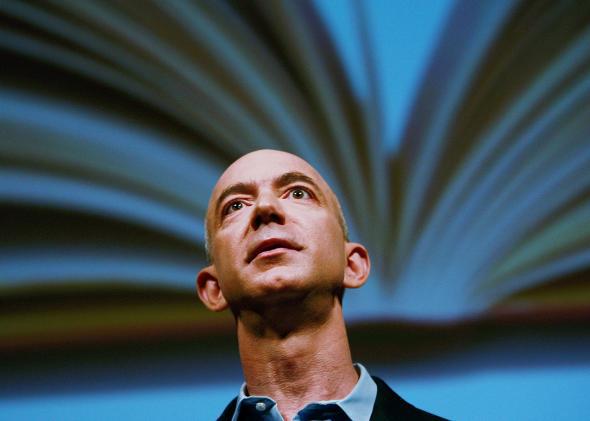Amazon has a new target in its ongoing war with publisher Hachette: that book-hating, totalitarian, anti-democratic English author George Orwell.
Sometime between Friday evening and Saturday morning, Amazon unveiled a new message from its book team to readers. Published at the Web address “Readers United,” the letter encourages readers to email Hachette CEO Michael Pietsch (contact info provided) to complain about high e-book prices. Should readers have nothing in particular to say to Pietsch, Amazon suggests a few friendly talking points. (First up: “We have noted your illegal collusion.”) But before it gets to those recommendations, the company gives a short history lesson:
Just ahead of World War II, there was a radical invention that shook the foundations of book publishing. It was the paperback book. This was a time when movie tickets cost 10 or 20 cents, and books cost $2.50. The new paperback cost 25 cents—it was ten times cheaper. Readers loved the paperback and millions of copies were sold in just the first year.
Did the literary establishment embrace this? Absolutely not! Amazon says.
Instead, they dug in and circled the wagons. They believed low cost paperbacks would destroy literary culture and harm the industry (not to mention their own bank accounts). Many bookstores refused to stock them. … The famous author George Orwell came out publicly and said about the new paperback format, if “publishers had any sense, they would combine against them and suppress them.” Yes, George Orwell was suggesting collusion.
It continues to invoke Orwell throughout the letter. “Perhaps channeling Orwell’s decades old suggestion, Hachette has already been caught illegally colluding with its competitors to raise e-book prices,” Amazon writes. And later on: “It was never in George Orwell’s interest to suppress paperback books—he was wrong about that.”
Amazon’s economic argument, as it has stated before, is that e-books are highly price-elastic. This means that when the price of e-books falls, consumers as a whole purchase more of them. Amazon wants to sell most e-books at $9.99 instead of the $14.99 and $19.99 price points they sometimes carry. The company believes that reducing prices to $9.99 would allow customers to pay less while leading to a 74 percent increase in e-book sales, which would create more royalties for authors. “The lower price is good for all parties involved,” Amazon says. “The pie is simply bigger.”
The company does have a point about price elasticity—when Walmart began selling Hachette titles for 40 percent off in June, it saw sales of physical books rise 70 percent in just four days. Independent bookstores that offered discounts on Hachette books have also seen sales and foot traffic increase. On the other hand, Amazon’s argument that this is good for authors seems to assume that the pie will grow for each e-book and not simply in the aggregate. Sure, slashing the cost of a bestseller might cause sales to jump 74 percent, but will it do the same for a new author, or an academic with a relatively small and specialized audience?
Economic debates aside, one thing Amazon is almost certainly incorrect on is its reading of Orwell. As David Streitfeld notes at the New York Times, some quick Googling reveals a fuller text of Orwell’s comments on the paperback—and with it, a more nuanced view of his opinion. “The Penguin Books are splendid value for sixpence,” Orwell wrote, “so splendid that if the other publishers had any sense they would combine against them and suppress them.” Translation: Paperbacks are great! So great that they might drive publishers who don’t make them out of business!
But Orwell also had his concerns. “It is, of course, a great mistake to imagine that cheap books are good for the book trade,” he wrote. “Actually it is just the other way about. If you have, for instance, five shillings to spend and the normal price of a book is half-a-crown, you are quite likely to spend your whole five shillings on two books. But if books are six-pence each you are not going to buy ten of them, because you don’t want as many as ten; your saturation point will have been reached long before that.” He went on to conclude: “In my capacity as reader I applaud the Penguin Books; in my capacity as writer I pronounce them anathema.”
This, in a sense, is what the debate has hinged on all along: that lower e-book prices are good for readers but more dangerous for authors. Orwell surely didn’t hate the paperback. Nor would he have said the consequences of cutting e-book prices are as simple as Amazon would have its readers believe.
